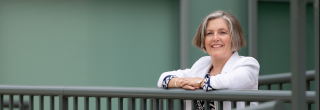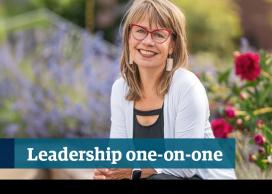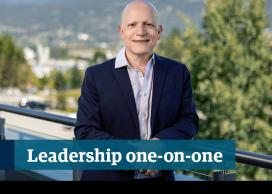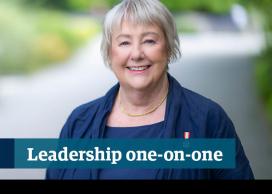Dr. Sarah Brears is the Regional Associate Dean, Interior, for the Faculty of Medicine’s Southern Medical Program (SMP). She provides strategic leadership for the Faculty’s undergraduate and postgraduate medical education programs within the Interior.
Having gained experience working as a physician in rural, remote and urban regions in Canada, Dr. Brears first joined the SMP back in 2012 as the Family Practice Site Director. She went on to serve provincially as Clinical Experiences Integration Co-Lead and then the MEDD 422 Course Co-Director.
Dr. Brears role includes working with partners, such as Interior Health, helping to shape a high-quality educational experience for all of UBC’s learners in the region, as well as facilitating the Faculty of Medicine’s health research strategy for the Interior.
In addition to being a family physician, medical educator and mom, Dr. Brears is passionate about working with patients, to help them achieve and maintain wellness. She also enjoys working closely and collaboratively with physicians in the region, helping them meet the needs of their community.
Q1. What quality do you most admire in a leader?
SB: I admire leaders who are approachable and who encourage you to reach out to them with questions and concerns. I also admire leaders who are able to connect on a personal level and demonstrate humility — a leader who can say “I don’t know” or “I made a mistake,” recognizing that none of us are perfect and we’re all human.
Q2. What makes you laugh?
SB: People being silly, whether that be kids or adults having fun. For example, I took part in a costume-themed online exercise class where everyone dressed up. We laughed so hard that there was more laughter than exercise. I also really like it when laughter catches me by surprise, especially during times when I least expect it.
Q3. Who inspires you, and why?
SB: In my current role, it’s my team. I’m always inspired by their creative ideas and expertise. I’m also inspired by two of my good friends from medical school — I admire their courage to make changes in order to advance their knowledge and understanding of health and wellness.
Q4. For you, what makes UBC different?
SB: I think UBC is different because of the interdisciplinary teaching and learning that takes place, as well as the collaboration that I see across all the disciplines. There’s also a high degree of engagement with the community — research and teaching at the university are both linked very closely to what the community wants and needs.
Q5. What is the most important lesson you’ve learned, in your career to date?
SB: To be curious and keep asking the questions until I understand. It’s important that I take the time to understand what’s happening, what the process is, and what my role is in that process. Also, to be patient, and wait for ideas to take hold. I think that’s true in both medicine and leadership.
Q6. How do you like to recharge?
SB: I like to get outside — I go hiking throughout the year and kayaking in the summertime. I make it a priority to go out amongst the trees at least once a week, rain or shine. It has also been a safe way to connect with people during COVID-19.
Q7. What is the best advice you were ever given?
SB: To be confident in what I bring to the table that I’m invited to. Recognizing that through my own experiences, I bring a unique perspective, so it’s important to speak up when there is something to say. Also, to spend time listening, watching and observing what is and isn’t being said as a way to learn.
Q8. What do you value in your colleagues?
SB: Honesty, which to me goes hand in hand with courage. The honesty to call out the things that aren’t working and the courage to suggest new ways. Honesty, and living with integrity, are part of my core values. When I can be honest, admit what I don’t know, talk about where I’ve struggled, or ask the questions I have, then I think it gives others permission to do the same.
Q9. What do you hope will be your lasting impact at UBC?
SB: I would like to see our medical school curriculum shift towards a more generalist approach, with an increased emphasis on primary care and health promotion as a way to help prevent disease. It’s a gradual movement that involves a shift towards recognizing the value of prevention and chronic disease management in addition to acute illness care.
Q10. If you could have a super power, what would it be?
SB: I’d love to be a mind reader so that I could tell when someone isn’t saying what they really want to say. It would be great because I also think that there’s a lot of humour and creativity that we don’t always get to see or hear in others.
Q11. What are some of your proudest moments since you were appointed as Regional Associate Dean, Interior?
SB: There are a couple of things that make me go “hooray, we’re doing it.” The first is hearing from students who have graduated from our program and are choosing to practice in our region or one of the smaller towns in BC. That to me is our mission. When we hear it happening, it means that we're having the right impact.
The second, is watching how well our teams have managed to deal with the stress of COVID-19, shifting learning to online, and adapting some of the in-person teaching so that the clinical learning experiences are safe and our students have the skills that they need to graduate and go on to residency. It has been tremendous to see faculty and staff pull together and manage this incredible pivot.
Q12. The Southern Medical Program celebrates its 10th anniversary this year (September 2021). What are the key priorities for the program moving forward?
SB: Our students benefit from an experience in a smaller program where they get to be known by the medical community. So, one of our key priorities is maintaining the excellence in education.
Thinking about where we can grow and what we can do differently, we definitely want to look at continuing to improve our relationships with the local Indigenous communities and remain focused on research partnerships that help answer the communities’ questions. This in turn will help create more opportunities for meaningful educational experiences for our students.
We’re also looking to expand the impact of our Centre for Chronic Disease Prevention and Management. Our priorities include hiring researchers and building collaborative relationships with health authorities, clinicians, the UBC community, community partners and our local Indigenous communities.
Published: February 22, 2021
Interviewed by: Philip Keen, UBC Internal Communications



